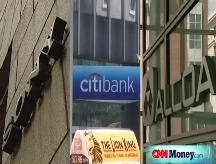Dollar rallies as economic jitters persist
The greenback rises against the euro, the pound, and the yen as traders flock to the perceived safety of U.S. currency.
NEW YORK (CNNMoney.com) -- The dollar rallied against major currencies Tuesday as investors sought safety in the U.S. currency after Fed Chairman Ben Bernanke said Wall Street may need additional bailouts.
Bernanke said President-elect Barack Obama's proposed fiscal stimulus package could help the economy but also warned that a lasting economic recovery may require additional bailouts of financial institutions.
Any signs of further economic weakness typically prompt traders to flock to low-yield, low-risk currencies like the dollar, which has also been getting a boost of late from weak oil prices.
Crude prices have fallen by almost $15 in the past week, hitting a low of $36.10 a barrel early Tuesday. Because oil is priced in dollars, lower oil prices typically push the greenback higher.
At 4 p.m. ET, the greenback was up 1.34% against the 15-nation euro, which was trading at $1.3183. That's the lowest since Dec. 12, when the euro stood at $1.3249.
But Oscar Martinez, foreign exchange manager at Wells Fargo, noted that mid-December week was a volatile period for the euro. That was when the Federal Reserve cut its key short-term interest rates to historic lows, causing the euro to spike to $1.4719 on Dec. 18. Since then, it's been a steady decline.
The buck gained 2.3% against the British pound, which fell to $1.4480. Meanwhile, the Japanese yen fell 0.11% against the dollar to ¥89.12.
"Europe is catching up to the United States in terms of negative economic factors," Martinez said. "They're going through same cycle as we are with bad housing and credit, just slightly later."
The euro was punished after Spain on Monday became the third euro zone country since Friday to be warned by Standard & Poor's rating agency that its credit rating could be downgraded.
On Friday, S&P warned Greece and Ireland that their ratings could be lowered.
"That's a big play in the euro zone," Martinez said. "It's weighing on the euro, and the market is correcting itself accordingly."
Martinez also noted this week's planned European Central Bank rate-setting meeting continues to drag down the euro. The ECB meets Thursday and is expected to cut its key interest rate by 0.5 percentage points to 2%.
The ECB and the Bank of England have had a long way to fall compared with the U.S. In January, the Fed's key interest rate stood at 3.5%. The Fed then slashed it to 1.5% on Oct. 8, cut it to 1% Oct. 29, and finally set it at between 0% and 0.25% on Dec. 16.
By comparison, ECB's rate stood at 5% in October, and the Bank of England's was 4.25%.
December's U.S. cuts marked the rate's first-ever fall below 1%. And while most investors were expecting a cut to either 0.25% or 0.5%, the Fed said it intends to keep rates near the current level for some time.
Martinez said he expects the dollar to continue strengthening as traders seek safe-havens in currency. "Long-term, I think the dollar will strengthen on intervention by the U.S. government," Martinez said. "We're a little ahead of the game because the Fed has been aggressive."
A small note of optimism for the overall U.S. economy may also push investors into the dollar, as traders tend to buy currencies from economies they believe in, he added.
"Most believe the economy will come back around the middle of 2009," Martinez said. "It will be a gradual movement, but it's on the horizon."
How do you think Barack Obama's presidency will affect you and your wallet? What can he do to help you - and others - in these trying economic times? E-mail us at realstories@cnnmoney.com, and your thoughts could be part of an upcoming story. ![]()



